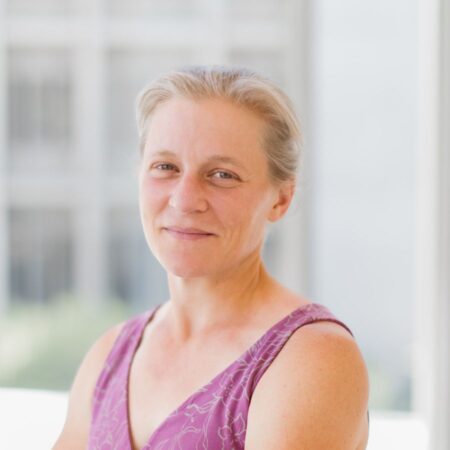Jenny Hoffman, PhD

Jennifer Hoffman is a Professor of Physics at Harvard University.
Hoffman explores new materials properties that emerge at interfaces and small length scales. Her research combines atomic layer-by-layer growth and atomic resolution imaging of materials, to uncover new physics and applications inaccessible via bulk synthesis and probes. For example, her lab uses scanning tunneling microscopy (STM) and magnetic force microscopy (MFM) to investigate fundamental mechanisms of electron pairing and technical challenges of vortex pinning in high-Tc superconductors, strongly correlated topological states in SmB6 and topological superconductivity in FeSexTe1-x. Her lab also designs acoustic metamaterials to mimic and understand quantum properties.
After completing a BA at Harvard (1999), a PhD at the University of California in Berkeley (2003), and postdoctoral work at Stanford, Jennifer has been on the faculty at Harvard since 2005. She is the recipient of the PECASE (Presidential Early Career Award in Science & Engineering), the NSF Career Award, the Sloan Fellowship, and the Radcliffe Fellowship. She is also an excellent teacher and mentor, who has won the Spark Award “for inspiring the next generation of women in science”, the Fannie Cox Award for “outstanding teaching in introductory science courses,” and the Roslyn Abramson Award for “excellence and sensitivity in teaching undergraduates.”
Jennifer is also a competitive long-distance runner, who has finished an Ironman and numerous 100-mile running races, with fastest time under 16 hours. She is a 3x USA Track & Field national champion at the 24-hour run, with a personal best of over 142 miles. In 2017, she was on USA’s gold-medal-winning team at the 24-Hour Run World Championships in Belfast, UK.
Graduate Studies
Undergraduate Studies
Awards
2010, Sloan Research Fellow, Alfred P. Sloan Foundation
2006, The Presidential Early Career Award for Scientists and Engineers, National Science Foundation
2008, The Presidential Early Career Award for Scientists and Engineers, National Science Foundation
Related News
